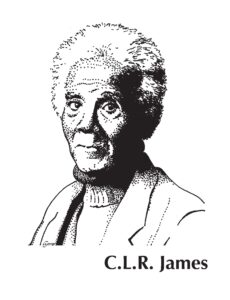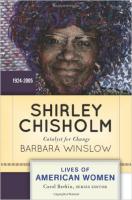
Wilson’s recollections of his association with Correspondence newsletter that was published in Detroit, Michigan, from 1959 to 1967, and of C.L.R. James.

Wilson’s recollections of his association with Correspondence newsletter that was published in Detroit, Michigan, from 1959 to 1967, and of C.L.R. James.

I grew up in the Great Depression era and so I grew up with Joe Louis. That was my marker. If you walked down the street when he was having a fight, every radio in every house was tuned to that fight. You could hear the fight walking down the street, literally. So, of course, Blacks were very proud of him.
And certainly having Joe Louis as the heavyweight champion you felt thrilled on the one hand, but on the other hand you felt ashamed because he was a very humble man and didn't push against the barriers, which were much stronger then, of course. Still we thought that with his fame, he might have pushed harder against those barriers.
 Shirley Chisholm: Catalyst for Change by Barbara Winslow brings back to our attention one of the most notable and esteemed African-American women of the 1960s and 1970s. Winslow reports that “a 1974 Gallup Poll listed her as one of the top-ten most admired women in America.” She was the first black woman elected to Congress.
Shirley Chisholm: Catalyst for Change by Barbara Winslow brings back to our attention one of the most notable and esteemed African-American women of the 1960s and 1970s. Winslow reports that “a 1974 Gallup Poll listed her as one of the top-ten most admired women in America.” She was the first black woman elected to Congress.

It used to be said that if you walked down any street in a black neighborhood during a Joe Louis fight you would not miss a word of the broadcast because every radio in every house would be tuned to the same station … and turned up loud. A few years later, the same thing could be said about a Sugar Ray Robinson fight. Sugar Ray and Joe Louis dominated their respective divisions for nearly three decades.
Books reviewed in this essay
After Brown: The Rise and Retreat of School Desegregation
Charles Clotfelter
Princeton: Princeton University Press, 2004
216 pp. $24.95
The Failures of Integration: How Race and Class are Undermining the American Dream
Sheryll Cashin
New York: Public Affairs, 2004
320 pp. $26
The first thing that strikes me about this book is the irony of the title: When was affirmative action not white? As Mark Nathan Cohen states in his book, Culture of Intolerence (Yale University Press, 1998), "Affluent white males themselves have always received the most affirmative action, some by law, some by custom and practice, and some by factors so subtle and so deeply ingrained in our cultural training that we generally don't consciously recognize them." He goes on to say, "Critics tend to find affirm
RANDALL ROBINSON HAS WRITTEN a searing, unforgiving expose of the forcible abduction, in February, 2004, of the democratically elected president of Haiti, Jean-Bertrand Aristide, and the consequent deepening wretchedness of its citizens. But he does more than that. In just 270 pages of text, he depicts Haiti from the triumph of the slave revolution in 1804 to the installation of Rene Garcia Preval as president in May, 2006, while thousands of the dissident black population shouted their displeasure and could be heard outside the gates of the presidential palace during the inauguration.